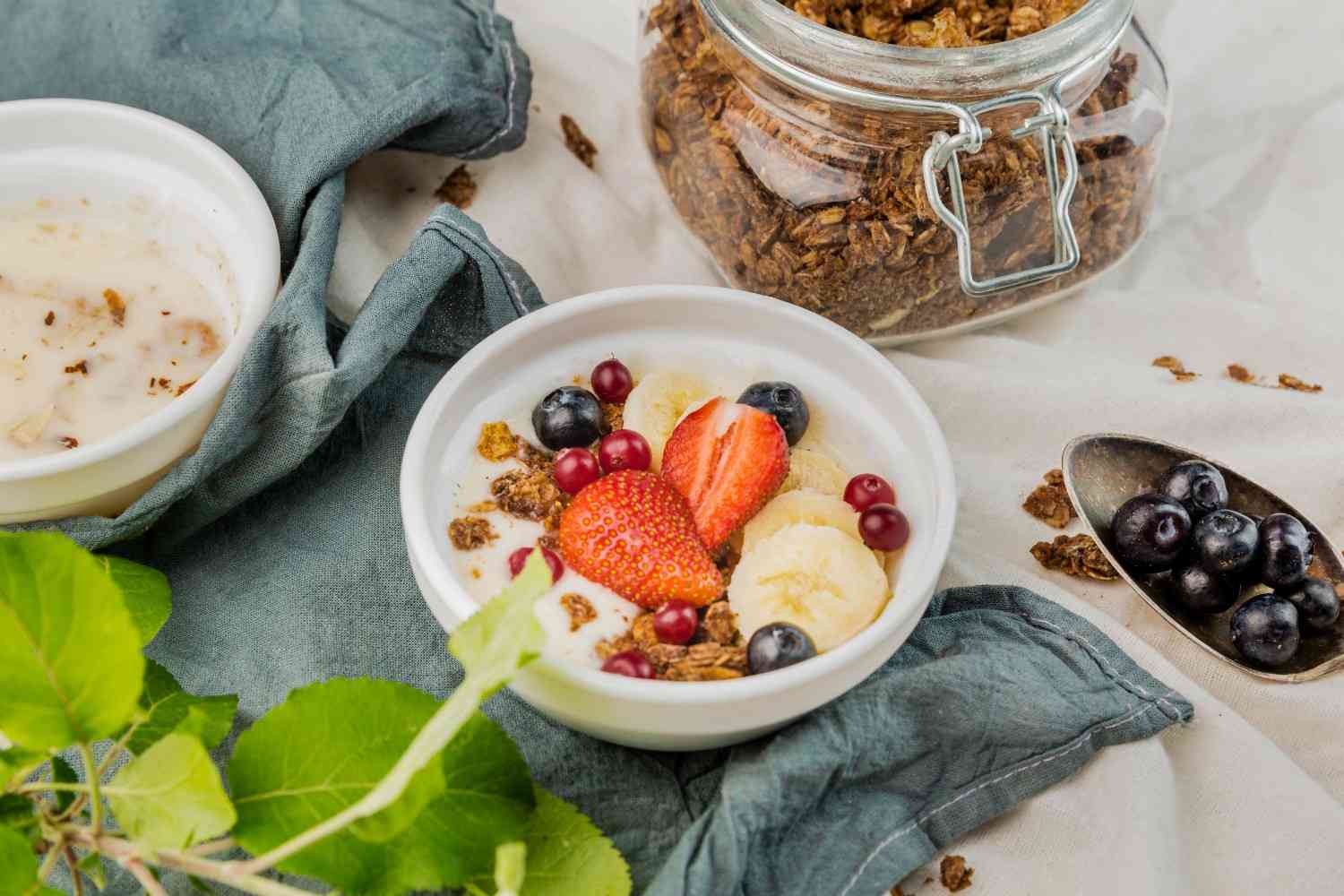Did you know that the food you eat can play a significant role in your eye health? It’s true! Incorporating specific nutrients into your diet can help protect your vision and even reduce the risk of age-related eye diseases. One of the unsung heroes in this nutritional lineup is yogurt. Packed with probiotics, calcium, and vitamins, yogurt is not only tasty but also a boon for your eyes. So, let’s dive into five delectable yogurt recipes that can give your peepers a little extra love.
Contents
Why Yogurt for Eye Health?
Before we get into the recipes, let’s talk about why yogurt can be beneficial for your eye health. Yogurt is rich in vitamins A and D, both of which are essential for maintaining good vision. Vitamin A, for instance, helps to protect the cornea, while Vitamin D is linked to reducing the risk of eye diseases like macular degeneration. Plus, probiotics in yogurt can enhance gut health, which is linked to overall well-being, including eye health.
Recipe 1: Creamy Spinach and Yogurt Dip
Ingredients:
- 1 cup plain Greek yogurt
- 2 cups fresh spinach, chopped
- 1 clove garlic, minced
- 1 tablespoon olive oil
- Salt and pepper to taste
- A squeeze of lemon juice
Instructions:
- In a skillet, heat olive oil over medium heat. Add garlic and sauté until fragrant.
- Add the chopped spinach and cook until wilted.
- In a bowl, mix the sautéed spinach with Greek yogurt, lemon juice, salt, and pepper.
- Serve chilled as a dip with whole-grain crackers or fresh veggies.
Benefits:
Spinach is loaded with lutein and zeaxanthin, antioxidants that can help filter harmful blue light and protect your retina. Pairing it with yogurt makes for a creamy, delicious dip that’s not only good for your eyes but also a hit at any gathering.
Recipe 2: Berry Yogurt Parfait
Ingredients:
- 1 cup plain yogurt (Greek or regular)
- 1 cup mixed berries (blueberries, strawberries, raspberries)
- 1 tablespoon honey or maple syrup
- 1/4 cup granola (optional)
Instructions:
- In a glass or bowl, layer yogurt, berries, and a drizzle of honey or maple syrup.
- Top with granola for a satisfying crunch.
- Repeat layers until you reach the top.
Benefits:
Berries are rich in antioxidants and vitamin C, both crucial for eye health. They help combat oxidative stress in the eyes and can reduce the risk of cataracts. Plus, this parfait makes for a fabulous breakfast or snack!
Recipe 3: Avocado and Yogurt Smoothie
Ingredients:
- 1 ripe avocado
- 1 cup plain yogurt
- 1 cup spinach (optional)
- 1 banana
- 1 cup almond milk or any milk of choice
- A drizzle of honey (optional)
Instructions:
- In a blender, combine avocado, yogurt, spinach, banana, and almond milk.
- Blend until smooth and creamy. Add honey if you’d like some sweetness.
- Pour into a glass and enjoy!
Benefits:
Avocados are a fantastic source of healthy fats and vitamin E, which can help protect the eye’s cells from damage. This smoothie is not only creamy and delicious but also packed with nutrients that your eyes will thank you for.
Recipe 4: Savory Yogurt Tzatziki
Ingredients:
- 1 cup plain Greek yogurt
- 1 cucumber, grated and drained
- 1 clove garlic, minced
- 1 tablespoon olive oil
- 1 tablespoon fresh dill, chopped
- Salt to taste
Instructions:
- In a bowl, combine the grated cucumber, garlic, olive oil, and dill.
- Fold in the Greek yogurt and season with salt.
- Serve chilled as a dip or sauce with grilled meats or pita bread.
Benefits:
Cucumbers are hydrating and contain antioxidants that can help combat inflammation. This tzatziki not only adds flavor to your meals but also packs a nutritional punch for your eyes.
Recipe 5: Yogurt and Walnut Breakfast Bowl
Ingredients:
- 1 cup plain yogurt
- 1/4 cup walnuts, chopped
- 1 tablespoon honey
- 1/2 teaspoon cinnamon
- Fresh fruit (like apple slices or banana) for topping
Instructions:
- In a bowl, mix yogurt with honey and cinnamon.
- Top with chopped walnuts and fresh fruit.
- Enjoy as a hearty breakfast or snack!
Benefits:
Walnuts are rich in omega-3 fatty acids, which have been shown to help maintain eye health. This breakfast bowl is not only filling but also a delightful way to start your day with eye-healthy ingredients.
FAQs
1. How does yogurt help improve eye health?
Yogurt contains vitamins A and D, which are essential for maintaining good vision. Additionally, probiotics in yogurt can support gut health, which is linked to overall well-being, including eye health.
2. Can I use flavored yogurt for these recipes?
While you can use flavored yogurt, it’s best to opt for plain yogurt to avoid added sugars. You can always sweeten it naturally with honey or fresh fruits.
3. Are there any caveats to consuming yogurt for eye health?
While yogurt has many benefits, it’s essential to maintain a balanced diet rich in various nutrients for optimal eye health. Also, if you’re lactose intolerant, consider lactose-free yogurt options.
4. How often should I eat these yogurt recipes?
Incorporating yogurt into your diet several times a week can be beneficial. However, balance is key, so pair it with other eye-healthy foods like leafy greens, fish, and nuts.
Conclusion
Incorporating yogurt into your diet can be a delicious and effective way to boost your eye health. From creamy dips to refreshing smoothies, these recipes are not just easy to make but also packed with nutrients that your eyes will love. So why not give them a try? Your vision may thank you for it!
Remember, while these recipes can contribute to a healthier lifestyle, they should complement a balanced diet and regular eye check-ups. As with any health-related advice, it’s always best to consult a healthcare provider for personalized guidance.
This article is for educational purposes only and is not a substitute for professional medical advice. Always consult a qualified healthcare provider before making changes to your health routine.
References
-
Mares, J. A., & Voland, R. (2009). The Role of Dietary Fat in Age-Related Macular Degeneration. American Journal of Clinical Nutrition, 89(6), 1854S-1858S. https://doi.org/10.3945/ajcn.2009.27124S
-
Lichtenstein, A. H., & Appel, L. J. (2006). Diet and Lifestyle Recommendations Revision 2006: A Scientific Statement From the American Heart Association Nutrition Committee. Circulation, 114(1), 82-96. https://doi.org/10.1161/CIRCULATIONAHA.106.176158
-
National Eye Institute. (n.d.). Age-Related Eye Disease Study (AREDS). Retrieved from https://www.nei.nih.gov/learn-about-eye-health/healthy-vision/age-related-eye-disease-study-areds
-
Mayo Clinic. (n.d.). Eye Health: A Guide to Maintain Healthy Eyes. Retrieved from https://www.mayoclinic.org/healthy-lifestyle/eye-health/in-depth/eye-health/art-20045418
Get Your FREE Natural Health Guide!
Subscribe now and receive our exclusive ebook packed with natural health tips, practical wellness advice, and easy lifestyle changes, delivered straight to your inbox.




